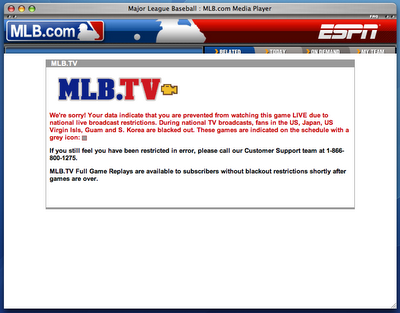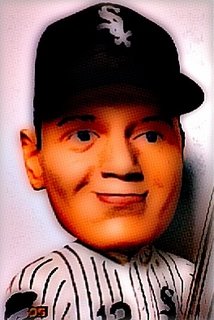MLB Blackout Policy Has Got to Go
Major League Baseball has a wonderful, incredible product that you can subscribe to called MLB.TV. For about $80 a season you can watch live, streaming video of almost every baseball game every day/night. It is awesome -- the ultimate service for out-of-market fans who cannot see their team on their local cable/satellite provider.
So what is the problem? MLB's blackout rules.
Despite the fact that you've paid MLB $80 to get into their little club, they still get to control what games you see -- in other words there are blackout rules that apply.
Those rules are:
MLB.TV LIVE BLACKOUT RESTRICTIONSThese rules don't seem too restrictive -- basically, you can't watch the team in your local area -- until you realize that they also apply every time there is a game airing nationally.
Local Live Blackout: ALL LIVE MLB.TV games will be blacked out in both teams' home telecast markets and in Japan.
National Live Blackout: Live games marked with grey icon will be blacked out in the U.S., Japan, South Korea, Guam and the U.S. Virgin Islands. Additionally, postseason live games will be blacked out in Canada.
 The result? (Pictured above) No White Sox vs. Orioles game for me this Saturday because FOX and MLB (despite my PAYING THEM $80) decided the only game I could watch was the St. Louis Cardinals vs. the Chicago Cubs.
The result? (Pictured above) No White Sox vs. Orioles game for me this Saturday because FOX and MLB (despite my PAYING THEM $80) decided the only game I could watch was the St. Louis Cardinals vs. the Chicago Cubs.Put as succinctly as possible: this is total crap.
I'm buying my way into a specialized content delivery system -- and in my opinion -- the blackout rules should not apply once I pay Major League Baseball out of my own pocket.
The national blackout is the biggest problem because at that point Big Brother is dictating to me what game I'm supposed to care about. In an age of digitalization and globalizationon where I can purchase a Seattle Mariners jersey or San Diego Padres jersey online just as easily as I could a White Sox jersey, this is a completely outdated system that should be destroyed.
The local blackout makes sense, as I understand that baseball has to protect team's local cable/satellite deals, but even this should be revisited. Why if I was a Brewers fan in Milwaukee couldn't I tap into MLB.TV at work to check in on the beginning of the game before I get home?
Interestingly, none of these blackout rules apply for the online radio subscription package even though radio signals often cover areas broaderer than TV signals.
But you don't just have to listen to just me, Yahoo! Sports' Jeff Passan has already done a very good job laying out the problem:
Blackouts, the thinking goes, are in place to guard teams from tickets going unsold because fans choose to watch the game at home. Is it truly necessary, then, to extend territories for hundreds of miles? If Horacio Muñoz, an El Paso, Texas, native who canceled his MLB.TV subscription this year, got off work at 5 p.m. and immediately started driving toward Ameriquest Field for a Texas Rangers game, he would arrive at 2 a.m. A trip to Minute Maid Park would land him in Houston around 4 a.m.
"How ridiculous are they in thinking I would drive in for a game?" Muñoz wrote. "Love baseball, but (this is) just another reason for me to go outside and enjoy the evenings."
On the other hand, blackouts apply when teams travel. So, for example, if a New York Mets fan lives in Orlando, and his cable or satellite provider does not offer the network that carries the Florida Marlins, he cannot watch the nine games each season the Mets host the Marlins at Shea Stadium.
That makes about as much sense as live games being entirely blacked out in Japan (to the chagrin of Kevin Allgood, a Georgia native in Kyoto) and half of Nevada – including Las Vegas, possible home to a major-league team in the future – having its own six-pack of blacked-out teams (the Los Angeles Dodgers, Los Angeles Angels, San Francisco Giants, Oakland Athletics, San Diego Padres and Arizona Diamondbacks).
Mentioning that more than a million people in Washington, D.C., can't see their home team, the Nationals, on cable because MLB's sweet deal gave Baltimore Orioles owner Peter Angelos his rival's broadcasting rights, or alluding to MLB selling its soul … er, TV rights to Fox and, because of that, blacking out every game on Saturday afternoons – well, that would be piling on.
At this juncture, it's too easy to point out the problems because there are so many. It's incumbent upon baseball to think of resolutions rather than sit on its hindquarters while dissatisfaction mounts.
It took baseball a long time to heal itself from the 1994 strike which turned so many fans off from the game. Baseball would be incredibly unwise to miss the on-demand train and turn fans off again because they cling to an archaic blackout map rather than embracing the technology which is bringing them closer than ever to their fans.




1 comment:
Hey, at least you got to watch a Chicago team win
Post a Comment